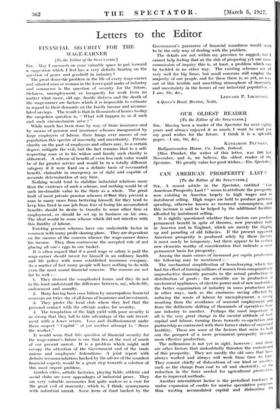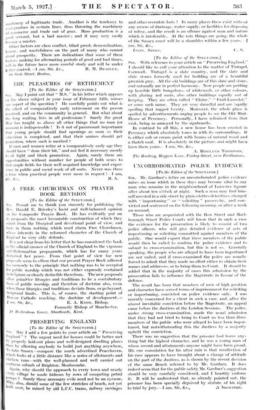CAN AMERICAN PROSPERITY LAST ?
[To the Editor of the SPECTATOR.] SIR,--A recent article in the Spectator, entitled Can American Prosperity Last ?" seems to attribute the prosperity now existing in America largely to high wages and to instalment selling. High wages are held to produce generous spending, otherwise known as increased consumption, and this increase is said to be helped by the additional facilities afforded by instalment selling.
It is rightly questioned whether these factors can produce permanent benefit in spite of theories, now prevalent both in America and in England, which are merely the diggini up and parading of old fallacies. If the present apparent American prosperity is produced solely by these factocg, it must surely be temporary, but there apPear to be certain new elements worthy of consideration that indicate a more permanent basis for prosperity.
Among the main causes of increased per capita production the following may be mentioned :- The mechanical simplification of hotsekeeping, which has had the effect of turning millions of women from comparatively unproductive domestic pursuits to the actual production or distribution of goods ; the scientific use in production 01 mechanical appliances, of electric power and of new materials ; the better organization of industry in mass production and in other ways, such as the enormous saving effected by reducing the waste of labour by unemployment, a saving resulting from the avoidance of seasonal employment and from the deliberate shifting of thousands of operatives from one industry to another. Perhaps the most important 01 all is the very great change in the mental attitude of both capital and labour, turning them towards eo-operation and partnership as contrasted with their former status of organized hostility. These are some of the factors that seem to hold out-the prospect of a more permanent prosperity through more effective production. The millennium is not yet in sight, however ; and there are other factors that undoubtedly threaten the curtailment of this prosperity. They are mostly the old ones that have always worked and always will work from time to time. They consist chiefly of dislocations of one kind or another. such as the change from coal to oil and electricity, or the reduction in the force needed for agricultural production, due to improved methods. Another intermittent factor is the periodical tendency to undue expansion of credits for unwise Speen- lative purPos"' thus wasting accumulated capital and dislocating the machinery of legitimate trade. Another is the tendency to tow-produce in certain lines, thus throwing .the machinery of commerce and trade out of gear. Mass production-is a good servant, but a bad master ; and it may very easily become a master.
Other factors are class conflict, blind greed, demoralization, luxury, and wastefulness on the 'Part of many who cannot stand prosperity. There are indications that some of these factors. making for alternating periods of good and bad times, %t-ill in the future have more careful study and will be "under































































 Previous page
Previous page